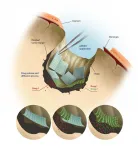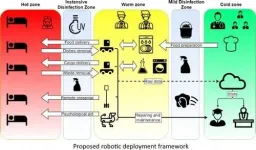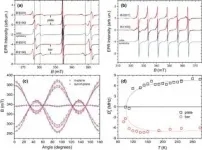SARS-CoV-2 variants from mink evade inhibition by antibodies
2021-04-19
(Press-News.org) It has been known for about a year that minks can become infected with SARS-CoV-2. The virus had been transmitted from humans to farmed mink and mutated in infected animals. Mutations were acquired in the spike protein, which is crucial for the entry of the virus into host cells and represents the central point of attack for antibodies. These SARS-CoV-2 variants from mink were transmitted back to humans, raising concerns that minks could be a continuing source of infection of humans with SARS-CoV-2 variants with altered biological properties. Researchers at the German Primate Center (DPZ) - Leibniz Institute for Primate Research in Göttingen, Germany, have now shown that an antibody used for COVID-19 therapy is unable to effectively inhibit SARS-CoV-2 harboring a spike mutation acquired in minks. In addition, the mutation reduced the inhibition of the virus by antibodies produced in SARS-CoV-2 infected humans. These results show that SARS-CoV-2 can acquire mutations in minks that may reduce control of the virus by the human immune system (Cell Reports).
More than three million people have died worldwide from the pandemic spread of SARS coronavirus-2 and its associated disease COVID-19, according to the World Health Organization (WHO). Animal-to-human transmission of the virus is believed to be the origin of the pandemic, which began in Wuhan, China, in December 2019. In April 2020, mink in Dutch mink farms developed a respiratory disease due to infection with SARS-CoV-2, which was transmitted from infected farm workers to the animals. The virus mutated in mink and different virus variants emerged, which were transmitted back to farm workers and then also transmitted from human to human. This observation was also made in Denmark and millions of minks were killed to prevent the transmission of new viral variants to humans.
The spike protein in the envelope of SARS-CoV-2 is responsible for the entry of the virus into cells in which it replicates. Researchers led by Markus Hoffmann and Stefan Pöhlmann of the German Primate Center have studied mutations detected in the spike protein of SARS-CoV-2 from mink, including mutation Y453F. The researchers wanted to find out whether this mutation affects inhibition of the virus by antibodies that are used for COVID-19 therapy or are produced in COVID-19 patients.
"Our results show that one of two antibodies from an antibody cocktail used for COVID-19 therapy no longer efficiently inhibits the viral variant with the Y453F mutation. Furthermore, our study demonstrates that the Y453F mutation reduces inhibition of the virus by antibodies produced by COVID-19 patients. This means that people who were infected with SARS-CoV-2 may have reduced protection against mink variants of the virus", says Markus Hoffmann, first author of the study. In sum, SARS-CoV-2 can mutate in minks in a way that reduces immune control by antibodies. Whether this is also possible in other animals to which the virus can be transmitted by infected individuals is currently unclear. "In the meantime, the Y453F mutation has also occurred in humans, but not through infection with a mink variant. When the virus replicates for a long time in people who are immunocompromised, resistant variants can emerge. In this case, the resistance-mediating mutation was identical to the one observed in mink," says Stefan Pöhlmann.
INFORMATION:
ELSE PRESS RELEASES FROM THIS DATE:
2021-04-19
A simple dietary supplement reduces behavioral symptoms in mice with a genetic mutation that causes schizophrenia. After additional experiments, including visualizing the fluorescently stained dancing edge of immature brain cells, researchers concluded that the supplement likely protects proteins that build neurons' cellular skeletons.
The supplement betaine was first isolated from sugar beets and is often associated with sweetness or umami flavor. Healthy levels of betaine come from both external food sources and internal synthesis in the body. Betaine ...
2021-04-19
Up to 25 percent of global food production is lost annually due to insects, primarily beetles. For the past 500 million years, beetles have successfully spread and adapted to life around the globe and now account for one of every five animal species on Earth. Yet as far back as ancient Egypt, these tough little bugs have invaded granaries and vexed us humans by destroying our crops.
As a result, food production and an abundant use of pesticides now go hand in hand. A large share of these pesticides damage biodiversity, the environment and human health. As various pesticides are phased out, new solutions are required to target and eradicate pests without harming humans or beneficial ...
2021-04-19
Atlantic bluefin tuna have returned to UK waters and can once again be seen during the summer and autumn months.
Their numbers appear to be increasing, following a long period of absence linked to population decline, according to research led by Cefas and the University of Exeter.
Marine scientists in the UK and Ireland have analysed multiple datasets, spanning a 16-year period, to document the increase in bluefin, which arrive into the waters of the Celtic Seas and off South West England, the Scilly Isles, and North West Ireland to feed in late summer and autumn.
The research is part of the Defra-funded "Thunnus UK" research project. ...
2021-04-19
Stroke risk for patients with traumatic brain injuries is at its highest in the four months following injury and remains significant for up to five years post-injury, finds a new systematic review led by a team at the University of Birmingham.
Traumatic brain injury (TBI) is a global health problem affecting over 60 million people a year worldwide. Incidences of TBI are rising due to a range of factors including increased falls in the elderly, military conflict, sports injuries and road traffic accidents. However, advances in critical care and imaging have led to a reduction in TBI-related mortality.
Previous studies have associated TBI with a long-term risk of neurological diseases including dementia, ...
2021-04-19
There are many variants of "goblet cells" in the intestines and they seem to have different functions, according to a new study from the University of Gothenburg. The study indicates that defects in goblet cells of a particular type may be a factor contributing to ulcerative colitis, an inflammatory bowel disease.
The entire inside of our intestines is covered by a thin layer of mucus that protects the fragile mucous membrane (mucosa) from bacteria and other microorganisms. If the microorganisms repeatedly come into contact with the intestinal mucosa, inflammation and even cell changes may result. These increase the risk of intestinal cancer. In a healthy colon, the mucus layer is up to a millimeter ...
2021-04-19
Genova (Italy), 16th April 2021 - A micro-sized polymeric net wrapping around brain tumors, just like a fishing net around a shoal of fish: this is the microMESH, a new nanomedicine device capable to conform around the surface of tumor masses and efficiently deliver drugs. It has been described by the researchers of the IIT - Istituto Italiano di Tecnologia (Italian Institute of Technology) in Nature Nanotechnology. The new biomedical implant has been validated in preclinical studies that demonstrate its effectiveness for the treatment of glioblastoma multiforme.
This work has been carried out by the group of Prof. Paolo Decuzzi, head of the IIT Laboratory of Nanotechnology ...
2021-04-19
The prevalence of intellectual disabilities, which means difficulties with learning and understanding new things, is roughly 1-2% in the population. People with a severe intellectual disability need help from others in daily activities throughout their lives.
Such disabilities can be caused by genetic changes or external factors. According to estimates, roughly 2,500 genes underlie intellectual disability, of which approximately half remain unidentified.
In recent years, the diagnostics for intellectual disabilities have improved thanks to advancements in techniques that make it possible ...
2021-04-19
Language is one of the most notable abilities humans have. It allows us to express complex meanings and transmit knowledge from generation to generation. An important question in human biology is how this ability ended up being developed, and researchers from the universities of Barcelona, Cologne and Tokyo have treated this issue in a recent article.
Published in the journal Trends in Cognitive Sciences, the article counts on the participation of the experts from the Institute of Complex Systems of the UB (UBICS) Thomas O'Rourke and Pedro Tiago Martins, led by Cedric Boeckx, ICREA research professor at the Faculty of Philology ...
2021-04-19
In December 2019, a new viral infection was detected in Wuhan, China. On January 30, 2020, the World Health Organization declared the outbreak a public health emergency of international concern, and on March 11, the COVID-19 pandemic. In light of the danger that the infection poses to human personnel, the idea to utilize automation in hospitals is one of the natural solutions in healthcare.
Among the paper's five co-authors, four are working in robotics and one is an expert in medicine. The paper presents a new concept of an infectious hospital that may become a worldwide standard in the future. The idea of this appeared while the authors ...
2021-04-19
While studying strontium titanate with electron paramagnetic resonance, a team from KFU's Center for Quantum Technology has found that the shape of a specimen of strontium titanate influences its internal symmetry. The research was co-conducted by the Ioffe Institute of Physics and Technology (Russia) and the Institute of Physics of the Czech Academy of Sciences.
At room temperature, SrTiO3 is a crystal with high cubic symmetry, that is, the lattice of strontium titanate, like bricks, is composed of unit cells, each of which is a regular cube. However, the researchers showed the picture is a bit more nuanced. In ...
LAST 30 PRESS RELEASES:
[Press-News.org] SARS-CoV-2 variants from mink evade inhibition by antibodies




